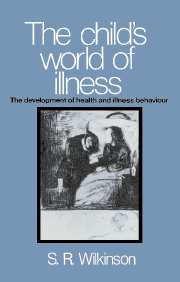Book contents
- Frontmatter
- Contents
- Acknowledgements
- Glossary
- 1 Presenting a problem
- 2 The form of dialogue
- 3 What has gone before: some background information
- 4 The primary structure to the child's world of illness
- 5 Germs and bugs: causal agents
- 6 Dirt and fresh air: the exogenous system
- 7 My castle and the good germs: the endogenous system and its boundary
- 8 ‘Pretend illness’: An analysis of how communication patterns can foster particular forms of complaints
- 9 The consultation: a form of dialogue
- 10 Health education and health promotion
- Appendixes
- References
- Index
3 - What has gone before: some background information
Published online by Cambridge University Press: 23 September 2009
- Frontmatter
- Contents
- Acknowledgements
- Glossary
- 1 Presenting a problem
- 2 The form of dialogue
- 3 What has gone before: some background information
- 4 The primary structure to the child's world of illness
- 5 Germs and bugs: causal agents
- 6 Dirt and fresh air: the exogenous system
- 7 My castle and the good germs: the endogenous system and its boundary
- 8 ‘Pretend illness’: An analysis of how communication patterns can foster particular forms of complaints
- 9 The consultation: a form of dialogue
- 10 Health education and health promotion
- Appendixes
- References
- Index
Summary
In the preceding chapter I presented a brief overview of the development of a child's capacities for dialogue and the communicative competences which appear to be the basis for this. The form of dialogue we establish sets the limits to the sort of information we can obtain, be that in a consultation, research or finding out whether our children are ill. The complementary aspect of dialogue is its content, and it is this that I will concentrate on here. In the previous chapter the developmental model proposed was one of coevolution of the child and the systems within which he develops. It is a similar relationship which I believe exists between the form of a dialogue and its content. Certain views can only be presented in certain fora. The moral orders of different settings facilitate the presentation of some types of information and hinder others. The content also plays its part in signalling what sort of moral order pertains, as does the form of dialogue used. Thus caution is necessary in interpreting the research presented here on what is known about children's views on illness, as the settings in which these views are elicited were seldom analysed at the same time.
I have used the phrase ‘some background information’ in the chapter title because I want to point out some additional similarities between the positions of the researcher, parent and doctor in a consultation.
- Type
- Chapter
- Information
- The Child's World of IllnessThe Development of Health and Illness Behaviour, pp. 33 - 62Publisher: Cambridge University PressPrint publication year: 1988



